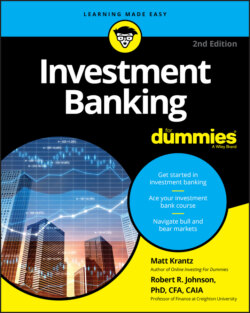Читать книгу Investment Banking For Dummies - Matthew Krantz - Страница 65
The type of analysis used in trading operations
ОглавлениеMany large investors that work with investment banks aren’t very transparent about the trading they’re doing — and that’s no mistake. One of the greatest downsides of trading is that when other investors get wind of the strategy and start to copy it, the strategy doesn’t work anymore.
Imagine that an investment bank’s client figured out that stocks tend to soar on the first trading day of January. Talk about an easy way to make money. The client would simply buy stocks on December 31 and sell them on January 1, or whatever the first day of trading is. But if the secret got out, other traders would buy stocks on December 31, too, which would spoil it for everyone. Why? The stock prices would be pushed up on December 31, essentially eliminating the January 1 pop.
Due to the value of keeping trading secrets quiet, you don’t often hear what investment bankers’ clients have been doing until the strategy blows up on them. But investors can see that typically trading strategies fall into several categories, including
Cross-market arbitrage: Arbitrage is a fancy word used to describe a situation when assets are temporarily mispriced relative to each other. These cross-market arbitrage strategies can get pretty complicated, because computers are programmed to find unexplained relative differences in price between stocks, bonds, exchange rates, and currency prices. The computers can locate mispriced assets and theoretically make risk-free trades.
Event arbitrage: Some trading operations try to anticipate and place bets ahead of major market-moving events. Events that may move stocks include a company being included in the popular Standard & Poor’s 500 stock market index, which is usually a boon for the stock. Another example may be a company being ripe to be bought or a small biotech firm getting approval to market a new blockbuster drug.
High-frequency technical trading: Another area of trading that some investment firms are turning to is a type of high-frequency trading where they take advantage of different trading speeds. It’s becoming increasingly common for large trading operations to develop light-speed networks that will let them place that buy or sell order just a millisecond or less before competitors, giving them an edge.
High-frequency technical trading is attracting attention from regulators. There’s a concern that some investment bankers are taking advantage of the trading systems to get an unfair advantage.
